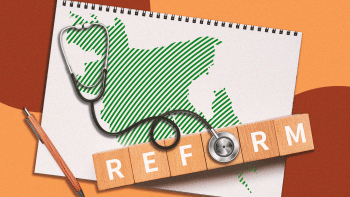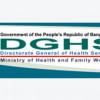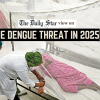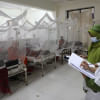Accessibility of healthcare in Bangladesh

Health is a fundamental human right and all citizens, regardless of their socio-economic status, have the right to enjoy optimal health. This article emphasises on the issue of equity in health systems. It underlines the importance of a comprehensive multisectoral approach to improve the health system. Though Bangladesh has an adequate health infrastructure, a cause for concern is the uncontrolled growth in the private health sector. The challenge is to regulate the mushrooming private sector from exploitative cost of treatment. The aim is to ensure that the disadvantaged and vulnerable population have better access to basic healthcare without the current back-breaking cost.
The government needs strengthen the Primary Health Care (PHC) system in partnership with the NGO sector. The NGOs lead the way in community-based initiatives and outreach at the grassroots. Utilising the private sector is also a priority but needs coordination and regulation. At the macroeconomic level, initiatives need to be undertaken that nudge the Bangladesh Ministry of Health and Family Welfare (MOHFW) towards reform and the adoption of new evidence-based practices that strengthen the health information system.
While the public health infrastructure in rural areas is considerable, this infrastructure needs an upgrade for maintaining quality PHC services. The quality of services remains a major issue, areas that need urgent attention is lack of investment in facilities. There is also an imbalance between availability and placement of human resources in the healthcare system. Frequent staffing mismatch in relation to demand-supply affect efficiency. The regulatory process to implement policies and laws is slow and often delayed in operation.
As Bangladesh becomes increasingly urban, the government's role in establishing a PHC infrastructure to deliver services in urban areas appears to be lackadaisical at best. Most commentators want to see the government considerably strengthen and fulfil its governance role in overseeing and monitoring aspects of health services. The government also needs to coordinate critical strategic developments, especially around the financing of this sector.
This begs the question, what should be the government's main role in health service delivery? Both the NGO and private sectors could be given specific tasks that are quantifiable to assess progress. They can develop guidelines and operational plans to help the ministry, donors, NGOs and the private sector work in a more coordinated manner.
Meanwhile, health experts in Bangladesh have felt a dire need for greater inter-ministry and intra-ministry coordination and collaboration. This is especially true between the Directorate General of Health Services (DGHS) and Directorate General of Family Planning (DGFP), and between the MOHFW and the Ministry of Local Government, Rural Development and Cooperatives (LGRD). With the latter being responsible for urban health, there is a need to decentralise the urban health system whereby city corporations can take primary responsibility for the health of urban people.
Some sector experts recommend a full-scale reform of the MOHFW with a modern structure and practices that make it fit to guide and govern the development of a modern PHC system in Bangladesh. Any serious changes within this ministry can only be brought about by decisions at the highest level of government. The latter, however, is mainly interested in wielding political power, rather than pushing bureaucratic reform and healthcare for the poorest.
The health system in Bangladesh needs dynamic leadership that is prepared to design and enforce evidence-based policies and programmes. The stewardship of the health system must have a strategic vision and determination to improve and strengthen both the public and private health sectors of the country. Equity must be the overarching guiding principle underpinning the health system.
A starting point for reform would be to ensure that a wider range of health personnel are included in health planning: women and men with an understanding and experience of PHC needs at community, union and upazila levels. People with requisite qualifications and expertise should be hired. Increasing representation of women in management and decision-making within the MOHFW should also be a priority, along with serious efforts to institutionalise gender equality. This would help improve understanding, thinking and practices across operational units and departments.
Similarly, there is a need to expand and develop the non-doctor health cadres to meet the basic needs of PHC. Such paramedics and non-medical professionals need training, and support for acting as the first-line service providers. They also need support for clear career paths and further personal growth. Nurses and medical technicians are two key professionals that require investment and augmentation by way of better training.
The current referral system at the primary care level also needs to be strengthened through capacity building. The current dynamic climate around healthcare in Bangladesh offers opportunities to explore the possibilities for more equitable financing mechanisms, especially for the poorest. A more inclusive and equitable health system will never be achieved if out-of-pocket expenditure on health is as high as 67 percent, as is now. This is pushing an estimated five million people into deeper poverty each year.
To facilitate strategic communication, policy advocacy to push the universal primary healthcare approach is needed. This can be achieved through regular engagement and convening with the senior leadership at all levels to support government efforts in formulation of Human Resources for Health (HRH) action plan. This will go a long way in implementation of the HRH strategy and action plan to bolster HRH production, mobilisation, deployment, and retention of human resources. The goal is to improve HRH competencies to deliver high quality health services.
If the expertise of personnel in the MOHFW, such as those at the Health Economics Unit of the DGHS, can be harnessed with field workers having exposure and understanding of ground realities, as well as innovators from the NGO and private sectors, the vision of an efficient healthcare system in Bangladesh can become a reality. For that to materialise, a strong leadership with necessary political will is essential.
Dr Md Khurshid Alam Hyder is public health specialist.
Views expressed in this article are the author's own.
Follow The Daily Star Opinion on Facebook for the latest opinions, commentaries and analyses by experts and professionals. To contribute your article or letter to The Daily Star Opinion, see our guidelines for submission.

 For all latest news, follow The Daily Star's Google News channel.
For all latest news, follow The Daily Star's Google News channel. 










Comments